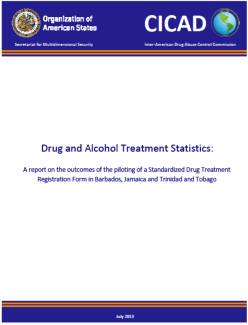Drug and Alcohol Treatment Statistics

Executive Summary
Data collected in drug treatment agencies play a prominent role in informing policy makers. Such data often represent the only information collected regularly and consistently over a certain period of time. What is even more important is the data that is collected during the intake and assessment process. The assessment process helps to identify and evaluate an individual’s current situation, issues and needs as well as to determine the most appropriate and effective means of helping the individual.
A standardized form was piloted among treatment centres in the Caribbean for a period of six months starting in November 2012 thru to April 2013, to capture intake data on clients attending for treatment in three countries, namely Trinidad and Tobago, Jamaica and Barbados. The data used in this analysis represents 510 intake assessments from 14 collection sites. The data from these sources are client information that is primarily collected at intake.
The data collected allowed for analysis among the following seven broad categories of variables: socio demographic data, referral and treatment history, current substance use, criminal justice history, psychiatric treatment history, contagious disease history, and placement after assessment.
There was relatively smooth implementation in the participating countries. Some very useful information with respect to the demographics, substance use, treatment history and criminal justice history was obtained from the application of the instrument. The quality of data depended on how well agencies complied with the protocol requirements and this compliance can be improved and assured by good initial training of persons from the treatment centers and regular follow up.
The major lesson learnt from piloting this instrument was that in the field of drug use epidemiology, treatment-based indicator data remain a source of some of the most valuable information available. The collection of such data is relatively easy and cost-effective and can be combined readily with the administrative work of personnel involved in the treatment process. Accepting the methodological framework and analyzing in detail the growing body of data can give a wealth of important and useful information.
Despite the limitations noted, the standardization drug treatment registration form is a simple but powerful instrument for tracking the changing patterns of problematic drug use and, as such, is a valuable epidemiological tool. For the most part the treatment data needs to be supplemented with information from other indicators to allow for sound conclusions to be drawn.